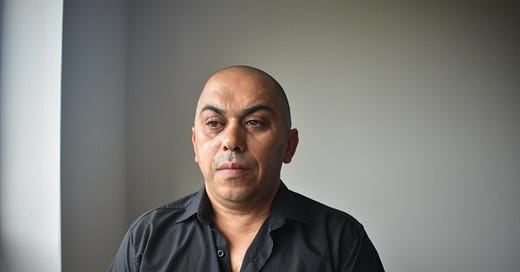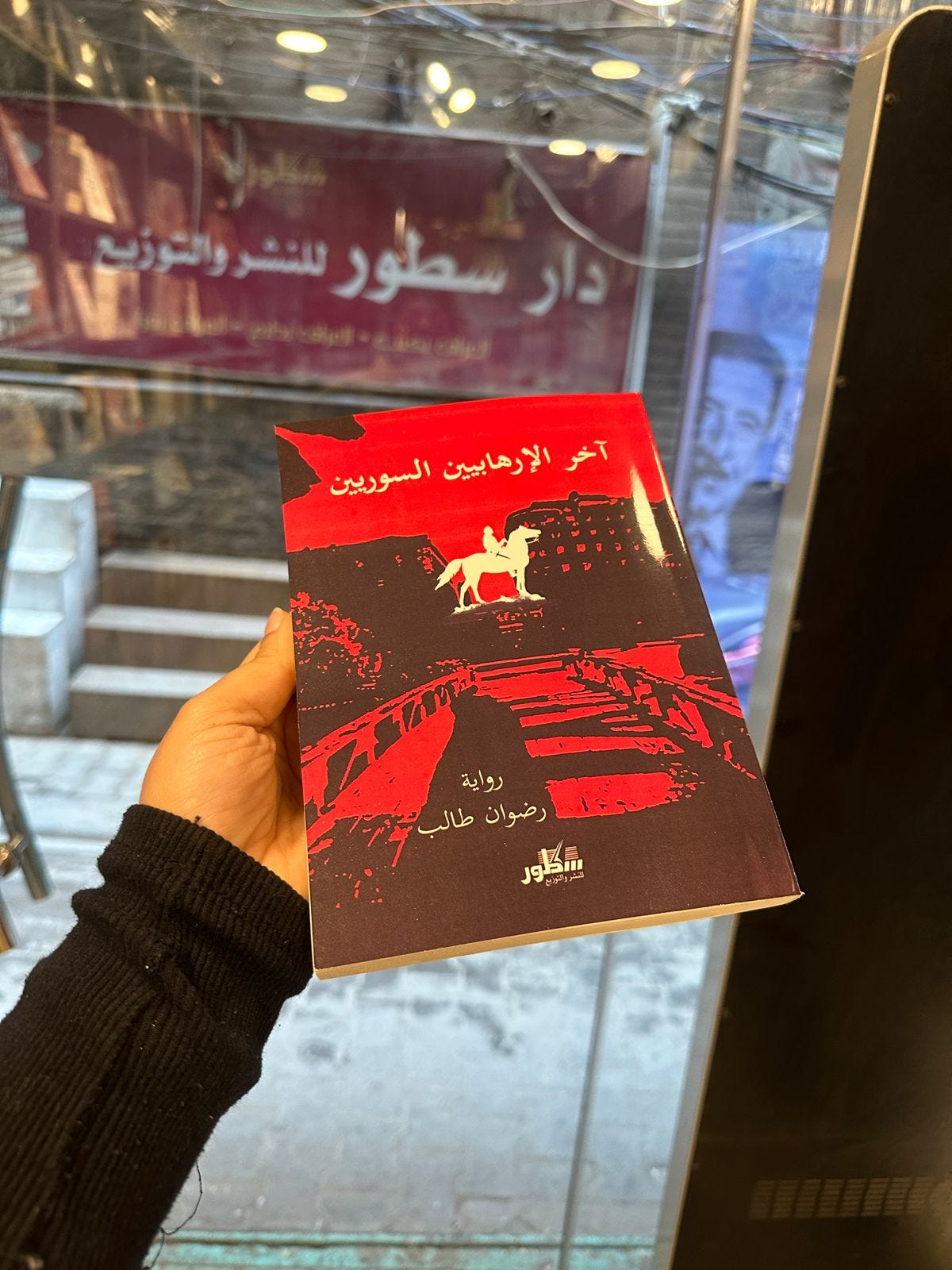The Last Syrian Terrorist
In his new novel, Radwan Taleb shines a light on northern Syria. “By understanding the situation there, one can understand why all the uprisings happened in the Arab world,” he says.
Radwan Taleb knows his new book will be divisive. “Some will love it. Others will hate it, and me for writing it,” says the 49-year-old, who sent his first novel, The Last Syrian Terrorist, to print last month. Working on it from Sulimaniye, where he moved after leaving Syria in 2014, has been “difficult and tiring,” a relentless return to a country being torn apart. “I tried to be as objective as possible, but I’m sure some people will feel hurt reading it,” he says.
Unlike his previous works, which include two short story volumes and a collection of plays for children, finding a publisher for this novel was difficult because it deals with Idlib, a region that has been written off by a world weary of Syria’s struggles. Here, in the country’s shattered northwest, civil war still rages, as a febrile mix of Islamist fighters, armed rebels, regime soldiers, and proxy forces continue the fight.
It’s a far cry from the peaceful protests that launched the uprising over 12 years ago at the other end of the country in Deraa. Idlib today is a treacherous battleground, where the presence of Al-Qaeda, ISIS, and affiliated groups has seen it labeled the capital of global jihad.
Yet this was not always the case. Before the revolution, northwest Syria was an agricultural area famous for its olive trees, handicrafts, and the ruins of ancient Ebla, which drew tourists from all over the world. It was only subsequently that Idlib became a bastion for extremist opposition and a target for some of the most intensive regime bombing campaigns of the war. “The regime claims the uprising in this area was led by Islamists and radicals, but when the uprising started, most people here were not even religious,” Taleb says.
Political Islam has been harnessed by regimes across the Arab world to manipulate and oppress their populations for decades. “You have to create enemies to fight against them,” Taleb says. This book is about how that played out in Idlib, where proxy forces continue to pulverize the region on a regular basis, dragging out a war that has claimed almost half a million lives and displaced an estimated 13 million people—more than half of Syria’s pre-war population. “I want to bring attention to northern Syria. By understanding the situation there, one can understand why all the uprisings happened in the Arab world,” Taleb says.
History on repeat
The novel unfolds in a village in Idlib, tracing the journey of a family through Syria's tumultuous history, from the early 1960s coup d'état of the Baath party to the 1973 war and the current Syrian crisis. One son, an ardent supporter of the Palestinian Fedayeen, reluctantly enlists in mandatory military service and finds himself confronted by pervasive corruption and hypocrisy within the Lebanese military.
The youngest brother resolves to escape the region and travels to Chechnya, where he witnesses atrocities committed by the Russian army there. Returning to Idlib during the 2011 Syrian revolution, he makes a life-changing decision to head to Damascus and take down the head of the regime. Throughout the novel, thought-provoking questions emerge, exploring the essence of terrorism and the multi-faceted corruption that pervades society as each generation takes up the fight.
The protagonist’s own son becomes embroiled in a plan to eliminate the head of the regime, pursuing extreme forms of terrorism that render the capital lifeless. The narrative provides a poignant portrayal of an entire community grappling with the aftermath of these harrowing events as the same struggles play out decade after decade, inflicting ever-greater suffering on ordinary people.
Printing this novel would have been impossible in Syria, but with support from an Ideas Beyond Borders Innovation Hub grant, Taleb secured a deal with an Iraqi publishing house to begin distributing copies at book fairs across the region. “Our support for freedom of speech is unwavering. Ideas Beyond Borders will continue to foreground courageous voices and give Arab audiences access to ideas that shape societies,” says Faisal Al Mutar, President of Ideas Beyond Borders. “Novelists like Radwan Taleb play a vital role in offering diverse perspectives that resist dangerous oversimplification and misinformation about complex places and events.”
In Idlib, the history of opposition to Assad's rule draws on decades of marginalization. When President Hafez al-Assad came to power in the early seventies and visited the region, he was pelted with tomatoes. Someone even threw a shoe. In retaliation, the city and surrounding areas were sidelined, excluded from social development, and labeled extremists for their opposition to the regime. When the uprisings against his son, President Bashar Al-Assad, broke out in 2011, Idlib was one of the first provinces to join the demonstrations, and it has paid a heavy price ever since.
Yet these days, Idlib and the Syrian civil war are rarely in the headlines, supplanted by more recent conflicts and events. For that reason, Taleb feels literature has a role in reminding the world that Syrians are still suffering, many living in limbo abroad, unable to return home. “After the revolution, the Syrian people understood that the international community actually wants to keep Bashar al Assad in power… people raised their voices, but there was nobody to hear them. If they keep doing it, maybe one day, people will hear them and their struggles,” he says.
The revolution in literature
Long after newspapers and media platforms have moved on, literature lingers to provide a lasting insight into how the world felt at a particular moment in time. In reckoning with one of the cruelest conflicts in recent history, writers who bore witness to events in Syria laid bare the fear and pain behind rolling headlines on the horrors of war. Novels depicting the fierce defiance of the early days and the outpouring of hope that spread across the region gave way to stories of terrible suffering and devastating loss as the regime retaliated with chemical weapons, torture chambers, and relentless bombing campaigns.
As the Syrian government turned on its people, suppressing peaceful protests with brute force, despair set in, and another kind of novel emerged, with authors turning towards science fiction and horror to convey the chaos and cruelty of war. A wave of dystopian fiction emerged, presenting readers with bleak, bullet-ridden landscapes, where death and destruction have replaced night and day in a world that has lost all sense.
Taleb’s novel builds on this genre by combining the realism of traditional Arab literature with a dystopian vision of the future, where new nightmares wait to unfold. By the end of the story, there is no more terrorism. “What replaces it is worse,” he says, describing a grim twist that follows the ruthless trajectory of the civil war as it unleashed ever greater suffering on the Syrian people.
Searching back through the past, he examines northern Syria over the last 60 years with a historian’s lens. “I try not to put the blame on one party or group but rather to explore why Syrians as people failed to establish the life they wanted. Obviously, the regime is to blame because they started this deadly loop of violence, but after that, everyone participated or was forced to because violence brings violence,” he says.
It's not a question he can answer, but by participating in the conversation, he hopes to shed light on the forces that shaped events in Idlib. With the protests long suppressed and the battle co-opted by violent extremists, it's up to literature and art to maintain the integrity of the revolution, in the hopes that, one day, the ideas and dreams that inspired the uprising will find a common voice again.
This article was written by Olivia Cuthbert.





